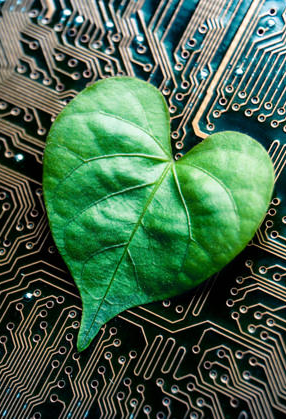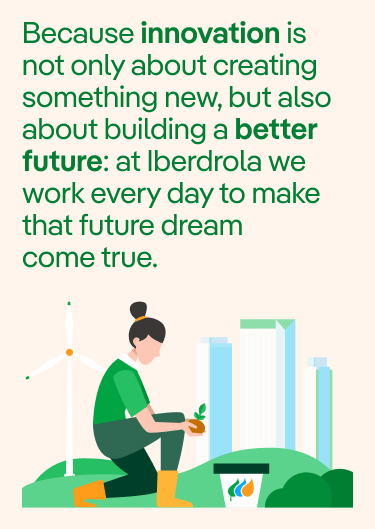12 types of innovation that transform businesses and industries
Why is innovation key to business success?
Innovation is a key cross-cutting axis for business success. It allows us to adapt to change, anticipate trends, solve problems creatively and offer more efficient, sustainable and customer-focused solutions. Far from being an option, innovation is a necessity to ensure competitiveness and sustained growth. Innovation takes many forms. Here are a couple types with their specific characteristics and impacts.

Iberdrola's Innovation and Training Campus in Madrid, a sign of the group's strong commitment to technology and R&D&I.
At Iberdrola, we’ve been committed to innovation as a key lever for transforming energy for more than two decades. Our strategy is based on developing technological solutions that not only respond to current needs but also anticipate those of the future. This has enabled us to position ourselves, for the fourth consecutive year, as the private utility that invests most in innovation worldwide according to the European Commission.
Innovation and sustainability: a necessary pairing
Innovation and sustainability are not independent goals, but complementary forces that must be integrated into a company as two cross-cutting axes of its identity and business. Innovation makes it possible to improve processes, products and services, and doing so from a sustainable perspective ensures that this process is maintained over time, minimising environmental impact and maximising social impact.
At Iberdrola, this vision is materialised in an innovation model aimed at transforming the energy industry through sustainability. With more than €400M invested annually in R&D&I and a cumulative investment of more than €2B over the last decade, we promote clean technologies, smart grids, and digital solutions that pave the way towards a greener future. We also incorporate the circular economy into our business.
Types of innovation every business needs to know about
Innovation is not just about developing revolutionary products. Below, we explore the 12 key types of innovation, with examples reflecting their impact on key sectors. In the case of the energy industry, the massive electrification of energy production and end uses is accelerating the need to innovate on multiple fronts to build a more secure, sustainable and digital model.

Corporate culture in the digital era
Digital transformation is the key to business competitiveness.

Innovation in our businesses
Iberdrola is the private energy company that invests most in R&D&I.

What is business intelligence?
How to interpret data to make the best business decisions.

What is digital ethics?
Internet Ethics: a key part of the digital future
Other types of innovation relevant to modern businesses
How to apply the types of innovation in your business
To implement innovation in a company, the first step is to observe its environment, listen to its employees and analyse its own internal processes. Innovation can arise from creating new products, improving existing ones, optimising processes, adapting the business model or adopting emerging technologies.
It can also involve changes in communication, stakeholder relations or positive social or environmental impact. Key strategies include as basic points:
-
Fostering a culture open to exploration and change
-
Collaborating with external actors and sharing knowledge
-
Adopting digital tools
-
Driving continuous improvement
-
Aligning innovation with the values of sustainability and social responsibility
At Iberdrola, innovation is not an end, it is a means to lead the change towards a cleaner, digital and fairer energy model. For our innovation model to work, the participation and commitment of all employees is essential. That’s why we promote a culture of innovation and intrapreneurship that permeates the entire organisation and promotes all employees’ participation and commitment, who lead ideas and solutions from within.


















